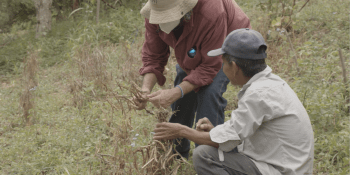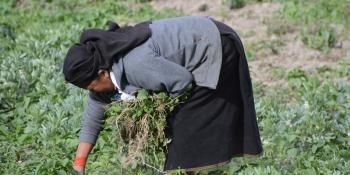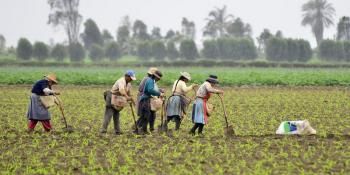Project pioneers: Understanding how women farmers lead the way in mitigation activities
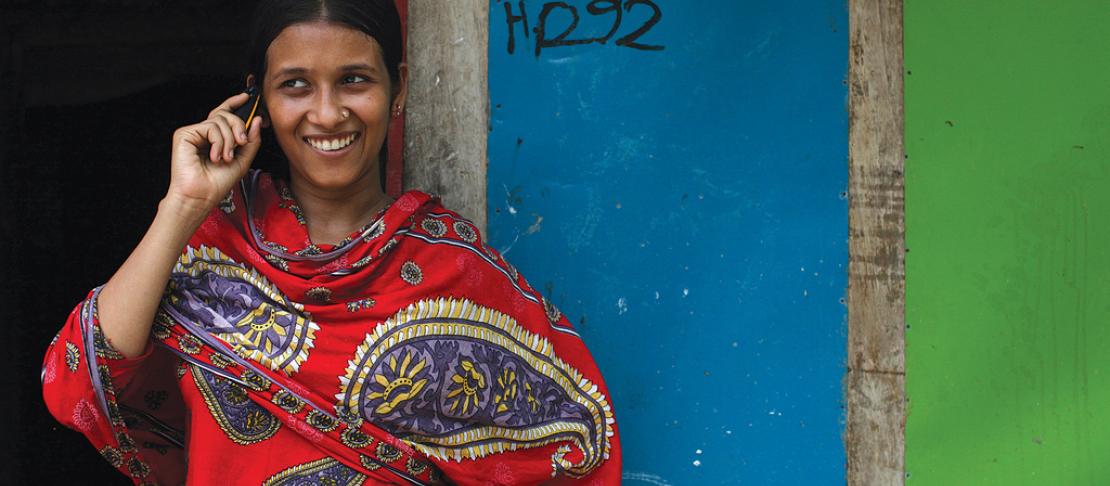
How do women farmers participate in – and lead – innovations that increase food security while also mitigating climate change?
Our gender strategy aims to ensure efforts to mitigate climate change benefit both men and women farmers. This strategy is being applied in a three action-research projects, in which women and men are already testing innovative approaches to low-emissions agriculture.
The ambition is to assess how women impact - and are impacted by - local innovations, new technologies and policies in agriculture, given different cultures, contexts and scales. We also want to understand how resourceful women solve problems and provide leadership within communities, despite numerous hurdles, while investigating how to scale up these efforts.
At the moment we are working with women farmers who are using information communication technology (ICT) in Bangladesh, with women and men using biochar and bioslurry to improve soils in Cambodia, and with women leading agroforestry projects in Honduras.
Our partner Prolinnova is supporting the work in all three countries. taking the lead in all three countries. Prolinnova's approach recognizes the creativity of smallholder farmers and supports the process of local innovation that leads to technological, socio-organizational, and institutional innovations that meets smallholder farmers' needs and addresses their constraints whilst strengthening their confidence and capacity to continue adapting to change.
The projects being studied are:
Information and communication technologies (ICTs) in Bangladesh
In Bangladesh, a group of women are using information and communication technologies (ICT) to share information and new ideas with each other and the communities they work in, with the goal to get farmers to adopt agricultural technologies that decrease deforestation and environmental degradation in and around the Sal Forest in Bangladesh.
Fostering Women Voices through Videos in Bangladesh has empowered both women and men farmers to improve soils through innovative strategies such as vermi-composting and use of botanical pesticides. Already, women are taking a pro-active role in this project in the northwest region of Bangladesh.
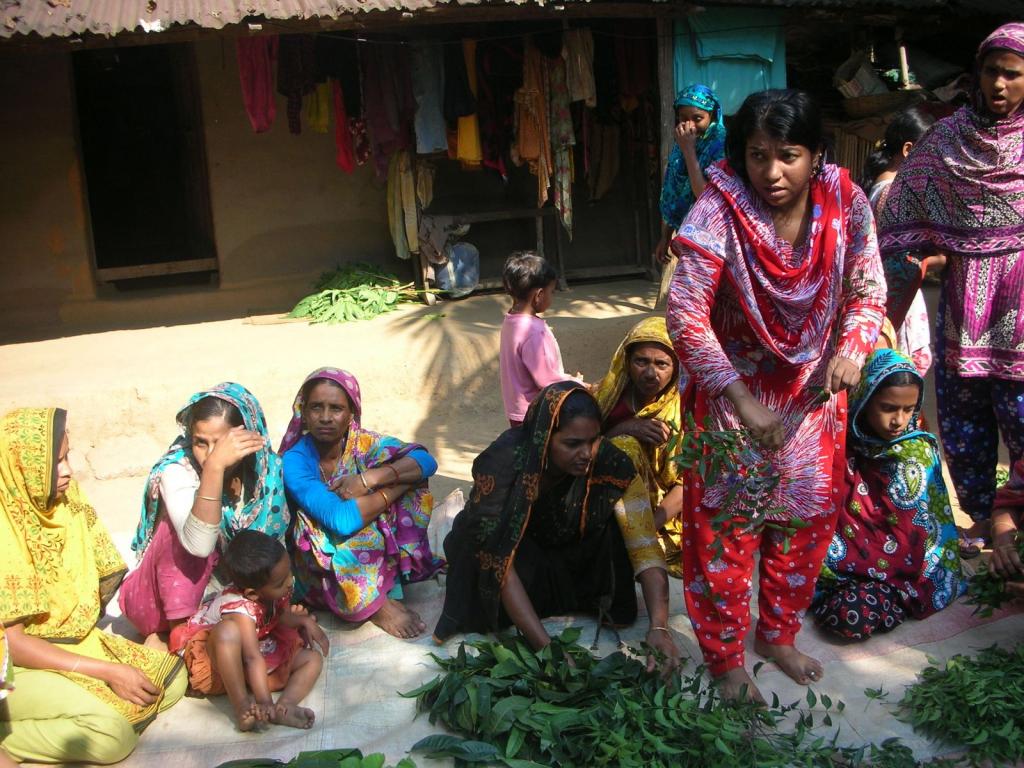
Women participating in the ongoing practices and preparations to improve farmland soil and productivity. Photo: ASaduzzaman Sarker
Such practices lead to improvements in crop yield, soil health, and carbon sequestration through the build-up of humus and other carbon compounds in the soil. Measurements of soil carbon and other key nutrients from the participants’ fields will increase scientific knowledge and evidence through a participatory approach.
This project receives support from the Centre for Development Research and the Vienna and Karl Kahane Foundation. Local support comes from partnerships with the Department of Agricultural Extension Education, Bangladesh Agricultural University, local non-governmental organizations, and community-based organizations. This is among the first projects in Bangladesh that includes embedded use of video with social media (e.g. facebook, blogs, youtube) to share the stories of farmers' innovations to both everyday citizens and policy-makers.
Agroforestry in Honduras
In Honduras, women farmers are planting trees for food, fuel, and fibers in dedicated plots, as well as utilizing more energy-efficient cook stoves. Interestingly, they are actively taking steps to integrate aspects of social and environmental well-being into their agroforestry strategies.
This will be the first agroforestry project in Honduras that measures carbon sequestration at the farm level, and may be a critical component to achieving carbon neutral approaches that consider the strengths and needs of women farmers!
Fundacion para la Investigacion Participativa con Agricultures de Honduras (FIPAH) leads the project in Honduras.
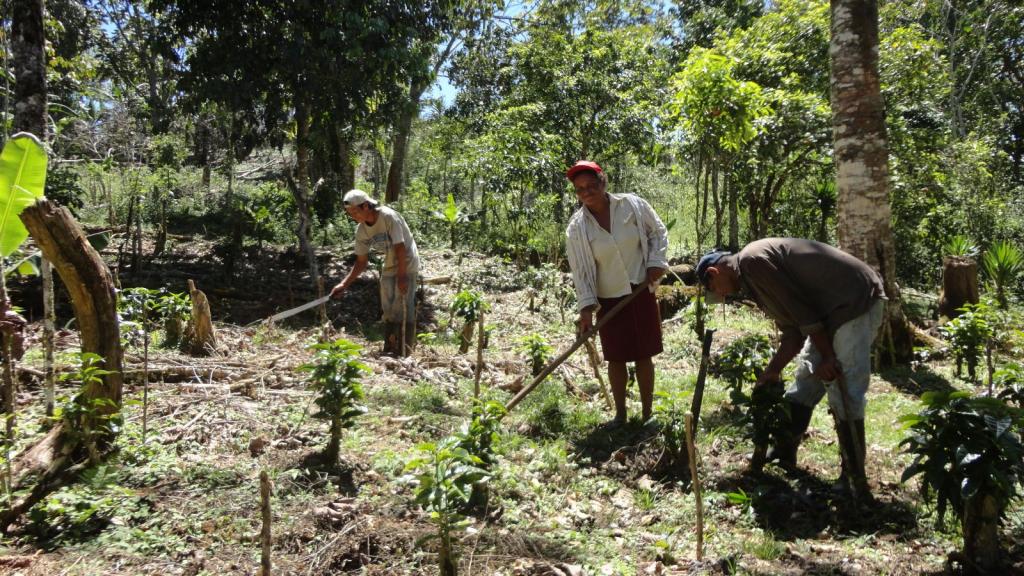
Aurora Figueroa with her husband adan bustillo, planting trees with their son to improve their surroundings, health and farm production. Photo: Marvin Gomez
Biogas and biochar in Cambodia
In Cambodia, women and men farmers identified livelihood challenges due to increasingly scare fuel wood and decreasing soil fertility. As farmers face longer and more extreme droughts, local farmers need increased retention of water and nutrients in the soil.
The group decided to try a combination of bioslurry (derived from biogas production) and biochar (derived from partial combustion of woody biomass in gasifier cook stoves) as a soil amendment to address both soil-related challenges simultaneously.
Farmers realized that the biogas and biochar also partially addressed the issue of deforestation by reducing demand for fuelwood for cooking. Innovative farmers have volunteered to carry out the experiment and are now testing different soil improvement strategies.
The Cambodian Center for the Study and Development of Agriculture (CEDAC) is taking the lead on implementing this project.
Mitigation and adaptation innovations impact men and women differently. It is often a complex picture of interactive and even surprising impacts that occur when a new agriculture practice or climate policy is introduced. These projects will shed light on these complex interactions while providing insights on how women are overcoming hurdles and becoming leaders in low-emissions agriculture projects.
Results from the project will become available later this year. In the mean time, please contact the authors for more information.
- Read more: New paper outlines gender strategy for pro-poor mitigation research (Blog)
- Learn more about our gender work: Gender and climate change page
Ryan Hottle is a researcher and consultant in agriculture and climate change. Julianna White is Program Manager for the CCAFS Low-Emissions Agriculture team. The story was edited by Cecilia Schubert, Communications Specialist.
This story is part of a blog-series aimed to highlight International Women's Day on 8 March and this year's theme #Inspiring Change. Help us celebrate IWD by following us online on Twitter, Facebook and Storify using #IWD2014 for more updates. Read additional gender-related stories on our blog.

